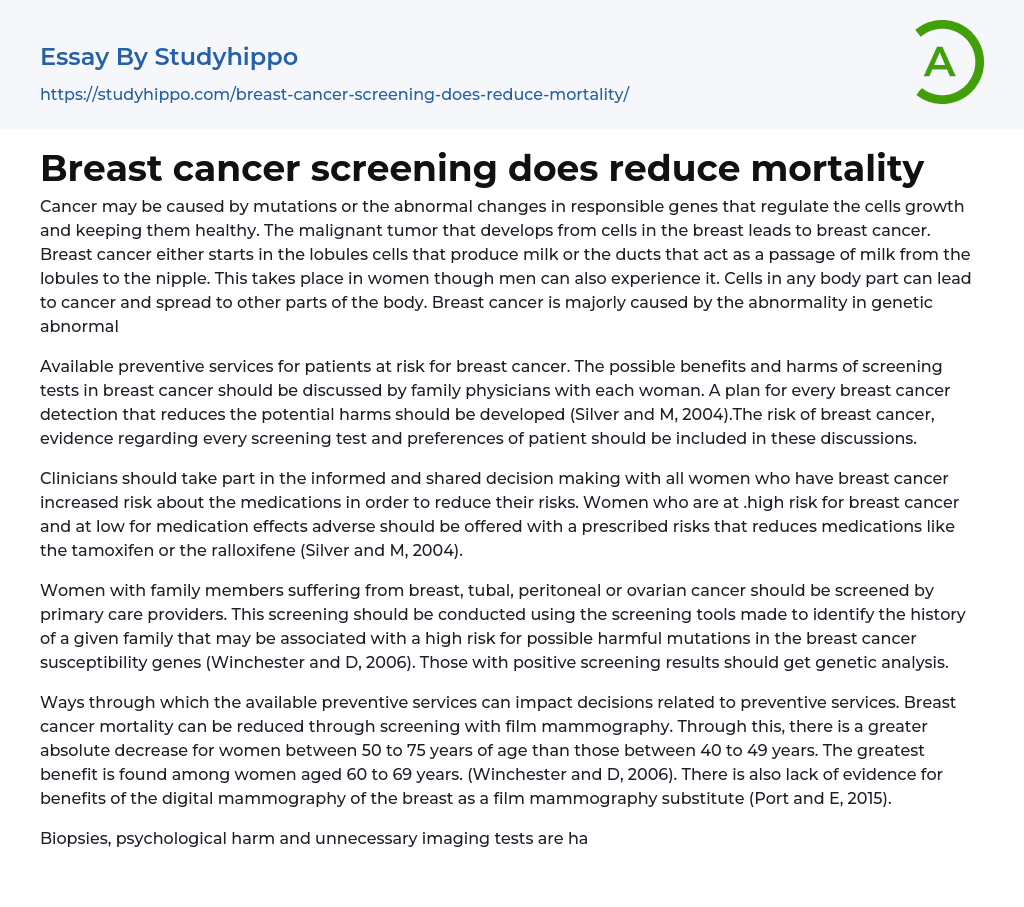

Breast cancer screening does reduce mortality Essay Example
Cancer is caused by genetic mutations or abnormal gene changes that impact cell growth and health. Breast cancer, in particular, occurs when cells in the breast form a malignant tumor. This tumor can develop in the milk-producing lobules or the milk ducts that carry milk to the nipple. While women are primarily affected by breast cancer, it can also occur in men. Cancer can originate in any part of the body and spread to other regions. Genetic abnormalities play a crucial role in the development of breast cancer. Preventive services are accessible for individuals at risk of developing this specific cancer.
Primary care providers should have discussions with each woman in their family about breast cancer screening tests, taking into account both the potential benefits and harms (Silver and M, 2004). It is crucial to create a detection plan that minimizes any possible negative effects. These
...conversations should include talking about the risk of breast cancer, examining evidence on different screening tests, and considering the patient's personal preferences. Clinicians should engage in informed decision-making together with women who are at higher risk for breast cancer to decrease their risks. Women who have a high risk for breast cancer but low risk for adverse medication effects could be offered medications like tamoxifen or raloxifene to lower their risks (Silver and M, 2004). Additionally, primary care providers should screen women who have family members with a history of breast, tubal, peritoneal, or ovarian cancer.
Screening for high-risk mutations in the breast cancer susceptibility genes should be conducted utilizing specialized tools to analyze a family's history (Winchester and D, 2006). Genetic analysis is recommended for individuals with positive screening results
Decisions regarding prevention can be influenced by the utilization of existing preventive services. Mammography screening has demonstrated a reduction in breast cancer mortality, especially among women aged 50 to 75 years compared to those aged 40 to 49 years. The greatest advantage is observed in women aged 60 to 69 years.
(Winchester and D, 2006) argue that digital mammography has not been proven to be advantageous when compared to film mammography for breast cancer screening. Moreover, (Port and E, 2015) highlight the negative outcomes of breast cancer screening including biopsies, psychological distress, unnecessary imaging tests, and the inconvenience caused by false positive results. They also acknowledge that while the overall harms of mammography screening are moderate across various age groups, the specific types of harm can vary over time.
Individuals with breast cancer have a range of drug treatment options depending on the type and stage of the cancer. Local therapies, such as surgery or radiation therapy, are used to specifically target and treat the tumor without causing harm to other areas of the body.
According to Silva et al, 2005, less advanced cancers are treated with these therapies. Drugs can be administered intravenously or orally to treat breast cancer, and the specific drugs used depend on the type of breast cancer (Silva et al, 2005). These therapies include hormone therapy, targeted therapy, and chemotherapy.
According to Morrow et al (2003), surgery is a common approach in treating breast cancer, and the specific type and stage of the cancer determine whether this treatment is necessary. Additional treatments may be required prior to or following the surgical procedure. Surgery can serve as the primary form of treatment when breast cancer
has advanced.
Breast cancer treatments have a profound effect on both immediate and long-term outlooks. Hair loss, which includes scalp, pubic hair, and eyebrows, is a frequent consequence of chemotherapy. Furthermore, specific chemotherapy medications can harm the ovaries and interrupt regular menstrual cycles.
According to Morrow et al (2003), women under 40 may have their periods return, while those over 40 may experience an earlier onset of menopause. Early menopause can affect bone health and lead to fatigue, resulting in a constant feeling of tiredness and lack of energy. These symptoms cannot be relieved even with prolonged rest.
Chemotherapy treatment has been associated with the development of brain cancer (Saunders et al, 2009), as well as potential weight gain in women who experience early menopause due to chemotherapy. Furthermore, cancer treatment has also been linked to heart problems and Leukemia.
References
- Silver, M. (2004). Breast cancer husband: How to help your wife (and yourself) through diagnosis, treatment, and beyond. Emmaus, Pa: Rodale.
- Winchester, D. J.
- Port, E. (2015). The new generation breast cancer book: How to navigate your diagnosis and treatment options -- and remain optimistic -- in an age of information overload.
- Silva, O. E., & Zurrida, S.
- Morrow, M., & Jordan, V. C. (2003). Managing breast cancer risk.
(2006). Breast cancer. Hamilton: Decker.
The text below includes and their contents:
(2005). Breast cancer: A practical guide. Edinburgh: Elsevier Saunders.
unified version (including the and their contents):
(2005). Breast cancer: A practical guide. Edinburgh: Elsevier Saunders.
Morrow, M., & Jordan, V. C. (2003). Managing breast cancer risk.
Hamilton: BC Decker Inc. Saunders, C., & Jassal, S. (2009). Breast cancer. Oxford: Oxford University Press.
- Apoptosis essays
- Asthma essays
- Black Death essays
- Breast Cancer essays
- Cholesterol essays
- Chronic essays
- Chronic Pain essays
- Death essays
- Diabetes essays
- Down Syndrome essays
- Epidemic essays
- Hypertension essays
- Infection essays
- Infertility essays
- Myocardial Infarction essays
- Pain essays
- Pathogen essays
- Pregnancy essays
- Sexually Transmitted Disease essays
- Symptom essays
- Tuskegee Syphilis Experiment essays
- Water supply essays
- Addiction essays
- Anatomy and Physiology essays
- Biodegradation essays
- Cancer essays
- Dental Care essays
- Disability essays
- Disease essays
- Disorders essays
- Health Care essays
- Infectious Disease essays
- Inquiry essays
- Intelligence Quotient essays
- Lung Cancer essays
- Medicine essays
- Neurology essays
- Nutrition essays
- Olfaction essays
- Physical Exercise essays
- Public Health essays
- Sex essays
- Women's Health essays
- World health organization essays



